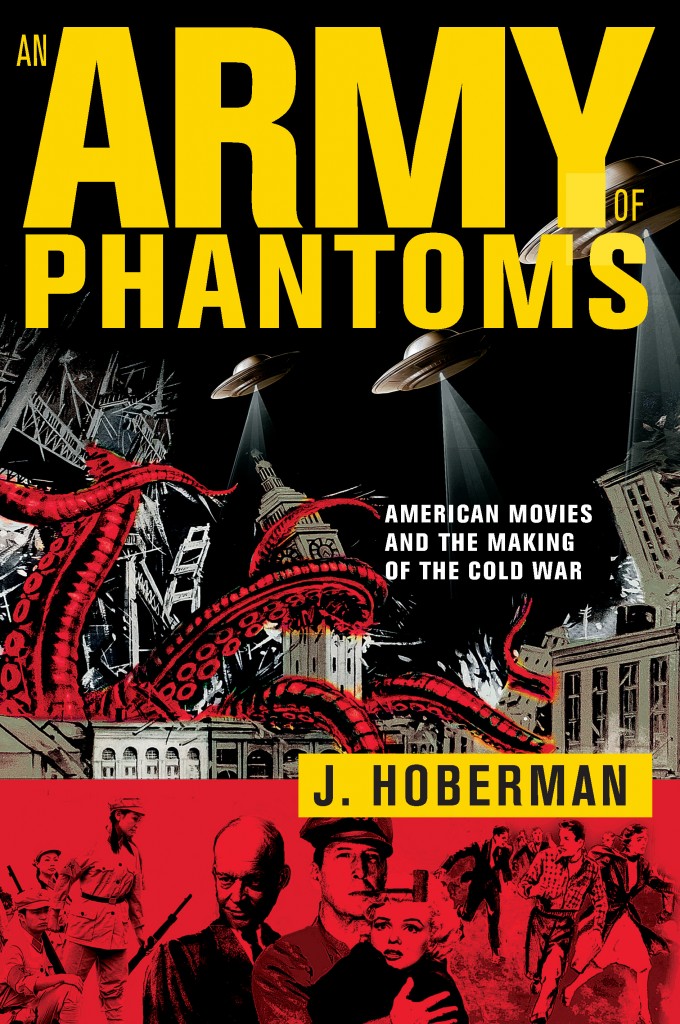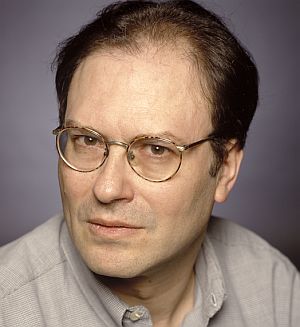By now we’re sure you’ve heard that the Village Voice has laid off J. Hoberman, senior film critic since 1988 and a regular Voice contributor since 1977. This is a devastating decision, but not entirely an unexpected one. After all, the Voice has also blithely sacked Robert Christgau, Nat Hentoff, and a number of other A-list writers in recent years.
All appearances to the contrary, Hoberman’s writing remains a paramount influence on what we do at the Northwest Chicago Film Society—how we think about movies, what we emphasize when we write about them, the specific cultural contours that inform our discussions. But the thought of a Hoberman tribute in this space would amount to a kind of premature eulogy—there’s vanished light but also light that we vanish. Surely Hoberman’s prodigious output will continue; this past year, in addition to his Village Voice column, he began a website (a premonition of platforms to come?) and published his latest book, An Army of Phantoms.
 Right now, the author’s Biography on the aforementioned website concludes with this now-wistful line: “Two daughters, a happy marriage, and eleven books aside, the thing of which he’s most proud is surviving for over 35 years in New York without the benefit of a normal job.” And that’s the rub: more than anything, the Voice’s decision signals (or, at this late date, seals) the end of an era in film criticism.
Right now, the author’s Biography on the aforementioned website concludes with this now-wistful line: “Two daughters, a happy marriage, and eleven books aside, the thing of which he’s most proud is surviving for over 35 years in New York without the benefit of a normal job.” And that’s the rub: more than anything, the Voice’s decision signals (or, at this late date, seals) the end of an era in film criticism.
But again, not in the way that you may have heard. Since the blood-letting began in 2006 (was it really more than five years ago that the Voice fired Michael Atkinson and Dennis Lim?), the future of film criticism has not exactly been an obscure topic. A number of high-profile events (Variety’s axing of Todd McCarthy, the winding down of Roger Ebert’s television show) and more diffuse trends (like the elimination of the film critic post at all but the highest-circulation metro newspapers) have kept the spotlight focused on this question. Over the past few years, seemingly every film festival and academic cinema conference has sponsored a panel on the state/future/end of criticism.
These events, while well-intentioned, usually devolve into misleading binaries: new media vs. old, newspapers vs. blogs, movie theaters vs. iPhones, old fogeys vs. sexy young cinephiles. (A spectre is haunting cinema…but I still don’t know anyone who’s admitted to watching, let alone preferring, a feature film on a smart phone.) The whole apparatus of film appreciation is collapsing—but look, there are kids writing passionately about Jean Eustache or Abel Ferrara! Take that, Newsweek—as if you would ever devote a spread to the genius of Philippe Garrel. The internet has opened/democratized/expanded criticism as never before! Criticism is healthy, even if you don’t have a job anymore.
Indeed, the Village Voice does represent a relic of, as the kids say, the dead-tree industry. Everyone has her own golden age and everyone remembers a time when the Voice was much better than it is now—and even then, there was someone telling you that your beloved Voice was but a cruddy imitation of its former self. (Should we date the official decline to the moment the Voice was name-dropped as a transparently outré gesture in that “La Vie Bohème” number from Rent?) But this isn’t just the patina of nostalgia; I think the Voice is objectively, abjectly less compelling than it was when I began reading it in 2003—less political coverage, less reporting, less of a genuinely counter-cultural, politically-informed attitude. And yes, that 2003 Voice was much diminished from the old broadsheet.
In its heyday, the alternative weekly floated an outrageous, but effective, business model: almost unlimited space for unwashed, if literate, flotsam, subsidized by ad revenue. The text was just there—a bonus. Was anyone even editing it? It didn’t matter whether you cared about the latest avant-garde provocation, you might pick up the paper for the classified listings, the personals, the phone sex ads, the movie listings, Life in Hell, or the gallery notices. It was an unconscious beast.
Whether someone looking for a good time at 2 am ever actually accidentally read about Aki Kaurismäki or Hou Hsiao-hsien is beside the point. The whole theoretical idea of a newspaper—alt or otherwise—was that someone looking for sports scores or lotto picks had to plow through all this other crap to find what he was looking for. It forced you to encounter other things. The newspaper was an ink-stained spatial representation of the culture itself—full of noise and distraction and all manner of uncomfortable juxtapositions, up-to-the-minute and infinitely disposable. (Hoberman understands this better than almost anyone, by the way; seek out his out-of-print monograph on 42nd Street from the British Film Institute and you’ll find a historian giddy with the free associational cultural collisions suggested by reading Depression-era newspapers on microfilm…)
Now, of course, the tables have turned. Rather than letting the sex support the articles, the new Voice produces more and more sex and fewer articles. Go read J. Hoberman’s final Voice review (appropriately enough, of Ken Jacobs’s latest at Anthology) and you’ll see a sidebar touting the online Voice’s original content:
I doubt anyone ever got rich writing for the old Voice, but their work was valued in a way that criticism today generally is not. Nathan Lee—who replaced Lim and Atkinson at the Voice in 2006, only to be let go himself in 2008—described his admirably and resolutely unconflicted position with S. T. VanAirsdale shortly after the first shake-up:
I’ve never had a staff position before. I’ve never had health benefits in my entire adult life. Dental care, health care, none of it. I have that now. So we can talk about the reputation of the New Times and the drama and the horror of the things they’ve done, but I have a job to do: I see movies and I write about them. For me it’s very simple, and for other people it’s not. I anticipate getting some flak for taking this job, but it’s just a job. I review movies. It’s what I do for a living.
Let’s be blunt about this: a staff position was a unionized position and that meant a baseline level of compensation and benefits. (Hoberman’s sign-off to his Voice colleagues, which he posted on his website, closes with a humble note of appreciation for allowing him to represent them in recent union negotiations.) The move to eliminate Hoberman isn’t all about his championing of “difficult” films by Cristi Piui or Raúl Ruiz or panning The Girl with the Dragon Tattoo. Hoberman’s replacement will likely not be a senior film critic, in any familiar sense. More likely is a string of free-lancers from other New Times papers, with substantially less drag on the bottom line.
Is film criticism a vocation or an amateur hobby? The internet has blurred, if not destroyed, this line. Ridicule old media all you want, but newspapers and other analog outlets eventually devised models that allowed people to make a living. The digital tide that threatens to wash it all away has not. Online journalism has scarcely proven profitable for the publishers (fantasy dead-ends like metering notwithstanding), let alone managed to compensate the writers decently. We’re all writing blogs now, but, aside from a few very rare instances, not getting paid for it.
 In some ways, this reflects broader attitudes in American society, a near-libertarian zeal for pursuing creative and individualistic endeavors for personal, effectively extracurricular reasons, rather than according ordinary work the dignity it demands. Even talking about compensation and benefits makes most people feel vaguely dirty, like a cold-hearted, materialistic appeal that sounds awfully impolite in a country whose school children are constantly indoctrinated about the virtues of volunteerism and hear next to nothing about labor history. And this in a landscape where college graduates with liberal arts degrees (often obtained in exchange for decades of real debt) scramble for employment scraps.
In some ways, this reflects broader attitudes in American society, a near-libertarian zeal for pursuing creative and individualistic endeavors for personal, effectively extracurricular reasons, rather than according ordinary work the dignity it demands. Even talking about compensation and benefits makes most people feel vaguely dirty, like a cold-hearted, materialistic appeal that sounds awfully impolite in a country whose school children are constantly indoctrinated about the virtues of volunteerism and hear next to nothing about labor history. And this in a landscape where college graduates with liberal arts degrees (often obtained in exchange for decades of real debt) scramble for employment scraps.
So, in effect, the question before us isn’t so much whether film criticism is dead or can suffer the blow of Hoberman’s abrupt Village Voice exit, but whether criticism is sustainable, whether we’ve actively devised models to make it worthwhile in the digital age. It can survive as a specialized thing, where bloggers talk amongst themselves, without any hope of compensation or contact with the broader public.
Loathsome establishment figures like Cass Sunstein tend to describe the internet as a social catastrophe that allows users to burrow further into tribal echo chambers with no exposure to dissenting views, but readers aren’t to blame here. They’re only seeking out what interests them, and finding an outlet for ultra-specialized expertise that was too esoteric, even for the old Village Voice. The well-educated, general-interest reader was always a fanciful conceit, but not a worthless one. We need a new conceit now.
Acknowledgment: This piece benefited extensively from discussions with Becca Hall and Edward S. Choi.

